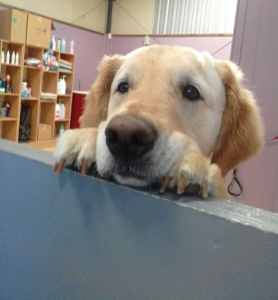PREPARING YOUR PET FOR SURGERY
PREPARING YOUR PET FOR AN ANAESTHETIC
Modern anaesthetics are very safe however there is a small risk of an adverse reaction to any anaesthetic or sedative drugs. There are a few things that can be done to help us ensure your pet has a safe anaesthetic and procedure.
SURGERY GUIDELINES
On the day of surgery, please ensure that your pet has been fasted for the previous 12 hours. Withholding food for this period of time reduces the risk of vomiting or regurgitation during the procedure. If for any reason this is not the case, please bring it to our attention. Your pet can have access to water up to and including the time of admission. Please also advise our staff if your pet is currently taking any medication prior to admitting them to the hospital.
Surgical procedures are performed in one of our two specially equipped sterile surgical theatres. The patient’s surgical site is prepared by clipping the area and scrubbing with a surgical antiseptic. Potential infections from surgery can be greatly reduced by bathing and shampooing your pet in the days ahead of admission to hospital. It is also important to let the staff know if your pet has been showing any signs of illness or lethargy over the 48 hours prior to admission.
HOW WE MAXIMIZE YOUR PET’S SAFETY DURING ANAESTHESIA
Prior to any medications being given to your pet a full phsyical examination is performed. This allows us to identify any potential problems with your pet. We may take any bloods at this time.
Once we are happy with your pets condition pre – anaesthetic medications may be given. These include a sedative and a pain relief injection. This reduces the amount of anaesthetic we have to give and helps your pet throughout their procedure.
All pets are monitored by a trained nurse for the duration of the procedure. Pets are monitored for respiratory rate, heart rate, blood oxygens levels and appropriate depth of the anaesthetic.
ADDITIONAL OPTIONS TO REDUCE RISK DURING ANAESTHESIA
There are further ways we can reduce risk during anaesthetics:
Premium Care (for routine operations)
Here at Greenfields Veterinary Hospital, we ensure very high standards are maintained during any anaesthetic or surgical procedure including our routine desexings. All of our patients that come in for desexing are placed on intravenous (IV) fluids during surgery, and are sent home with extended pain relief and wound protection (Elizabethan collar, antibiotic lotion, and anti-lick liquid).
The IV fluids support the body by maintaining blood pressure and increasing blood flow to the internal organs. This helps our patients to flush out the anaesthetic drugs quicker, achieving a faster and smoother recovery from the anaesthetic. In addition, having a pre-existing IV line during surgery enables our veterinarians to administer emergency treatment faster should any unforeseen problems arise.
Pre anaesthetic blood testing
Our state-of-the-art in house laboratory allows us to analyse a blood sample taken from your pet on the day of surgery. Checking liver and kidney function as well as performing a complete blood count enables our veterinarians and nurses to identify any potential problems prior to your pet going under anaesthesia, which could prevent serious complications arising.
Further testing may be recommended prior to surgery should the pre-anaesthetic blood screens indicate any problems.
HEALTHCARE
If your furry family members require any other health care procedures, such as booster vaccinations or a microchip, we can often provide this service at the same time as surgery. Not only is this more convenient for our clients, it also minimises any discomfort felt by our patients.

